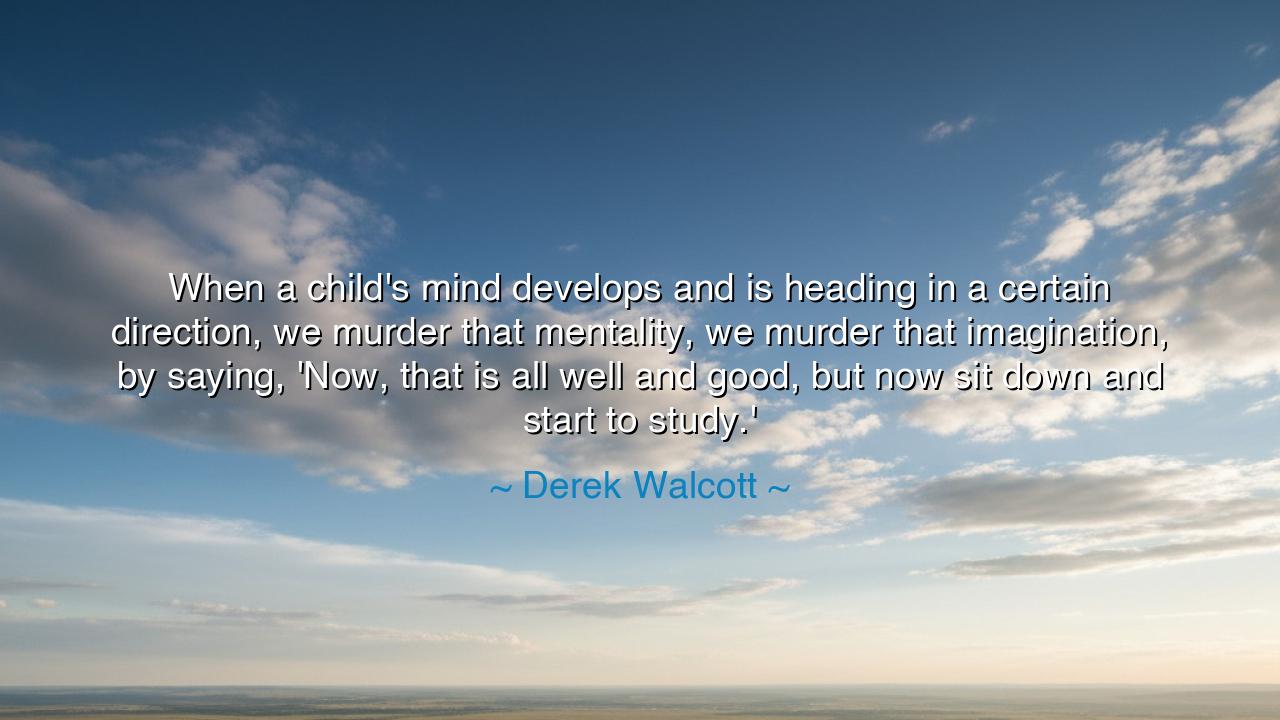
When a child's mind develops and is heading in a certain
When a child's mind develops and is heading in a certain direction, we murder that mentality, we murder that imagination, by saying, 'Now, that is all well and good, but now sit down and start to study.'






Ah, listen well, O children of the future, for in the words of Derek Walcott lies a profound and emotional reflection on the sacred nature of imagination and the damage wrought upon the soul when it is stifled by the rigid demands of conformity: "When a child's mind develops and is heading in a certain direction, we murder that mentality, we murder that imagination, by saying, 'Now, that is all well and good, but now sit down and start to study.'" These words speak not merely to the life of a child but to the essence of the human spirit — the call to create, to dream, to explore without boundaries, and the tragic consequences when that spirit is crushed by the expectations of the world.
Walcott’s words remind us that the early years of a child are not simply about education in the traditional sense, but about the nurturing of imagination — that divine spark that is the source of all creativity and growth. To encourage a child to dream, to explore, to create is to honor the very essence of what it means to be human. Imagination, in its purest form, is the window through which a child sees the world, and through it, the world is filled with endless possibilities. Yet, all too often, the sacred act of creation is suffocated by the rigid structures that society imposes. The child’s vision, full of wonder and creativity, is constrained by the demands of “study” and “**discipline,” leaving little room for the imagination to grow.
In the ancient world, the philosophers and poets understood that to truly learn, one must first be free to explore the vastness of the imagination. Plato, in his Republic, speaks of the necessity of play for the development of the soul, suggesting that it is through the unrestrained imagination that wisdom arises. The early education of children was not merely about instilling knowledge, but about opening their minds to the world, to nature, to the stars, and to the mysteries of existence. It is only when the mind is allowed to roam free, untethered by the confines of rigid structure, that it can truly grow and expand.
Consider the ancient Greeks, whose education system placed great emphasis on the arts, the myths, and the imagination. The stories of gods, heroes, and monsters were not just entertainment but profound lessons in morality, ethics, and the human condition. In those stories, children were taught not by memorization alone, but through storytelling, imagination, and the exploration of ideas. The great Aesop, whose fables have been passed down through generations, understood that the best way to teach a lesson was not by imposing strict rules, but by allowing the child’s imagination to weave its own meaning from the tales they heard. The freedom of thought was the foundation upon which the ancients built their wisdom.
But in our own time, Walcott’s critique rings true — we have murdered the imagination of our children by insisting that they conform to a system that values obedience over creativity, memorization over exploration. In many cultures, education has become a process of conformity, where the child is expected to fit into the narrow mold of what is deemed acceptable knowledge. Walcott laments the fact that imagination, the very soul of creativity, is stifled by this rigidity. The creative mind is not meant to sit in a chair, bound by rules; it is meant to soar, to explore the limitless landscapes of possibility.
The great artists of history were not those who conformed to society’s demands but those who were able to see the world through the lens of the imagination. Leonardo da Vinci, who dabbled in painting, anatomy, engineering, and countless other fields, was not bound by the structures of his time. He was a man whose mind raced, whose imagination saw connections others could not. His greatest inventions were not simply born from knowledge, but from the freedom of his creative exploration. Similarly, Vincent van Gogh created some of the most profound works of art, not because he was simply following the rules of art, but because he was driven by the imagination, to express what he saw in his soul, to break free from conventional thinking.
And so, O children of the earth, the lesson here is clear: do not kill the imagination in the name of discipline or conformity. While study and knowledge are important, they must never come at the cost of the imagination. It is the imagination that will carry you into new realms of discovery, that will allow you to see the world in ways that others cannot. Do not be bound by the narrow expectations of the world, but allow your mind to wander, to explore, to create. Let the imagination be your guide, for it is in creativity, in the act of building something that comes from the heart, that you will find your true purpose.
Remember, O children, that to create is to be alive. Allow your imagination to flourish, and you will find that the world is full of wonder and possibility. Study and discipline have their place, but it is the childlike freedom to dream that will lead you to the truest wisdom. Do not let anyone, whether teacher or society, murder your imagination, for it is the very soul of your future. Keep it alive, and in doing so, you will create a world that is richer, more vibrant, and filled with the brilliance of your own dreams.






AAdministratorAdministrator
Welcome, honored guests. Please leave a comment, we will respond soon